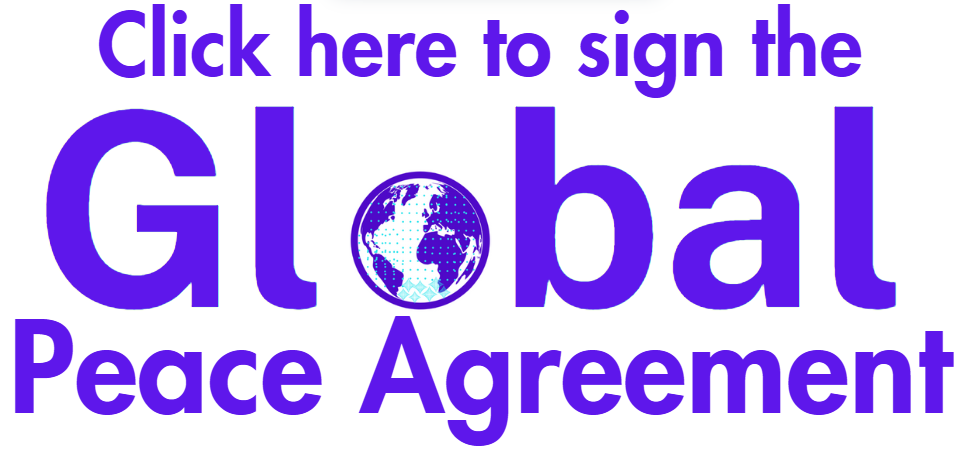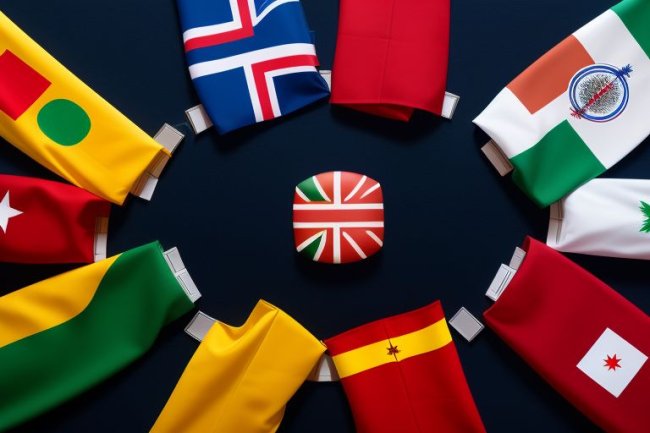SOVEREIGNTY OF NATIONS AND EXTERNAL CONTROLS
Equality of nations is a profound principle that encapsulates the essence of fair treatment, mutual respect, and balanced interactions between all sovereign states across the globe. It is rooted in the belief that every nation, regardless of its size, history, or socio-economic status, deserves an equal voice, opportunity, and recognition on the international stage. This concept goes beyond the mere absence of discrimination or bias; it aspires to create a world where nations cooperate, coexist, and thrive in a collaborative ecosystem that nurtures global equity and solidarity.

In a dynamic and interconnected world, the concept of equality among nations takes center stage as an essential cornerstone of international relations. This principle underscores the crucial endeavor to foster a harmonious and sustainable global society where nations come together to address shared challenges, harness collective strengths, and celebrate the rich tapestry of human diversity. Beyond its theoretical implications, the equality of nations is a pragmatic approach that acknowledges the interdependence of our planet's inhabitants and seeks to ensure that no nation is left behind in the pursuit of progress.
The essence of equality among nations lies in its ability to transcend borders, ideologies, and historical narratives. It is recognition that each nation possesses intrinsic value and potential regardless of its past or present circumstances. This principle engenders a mindset of inclusivity and empathy, fostering an environment where nations cooperate not out of compulsion but out of a genuine desire to uplift one another and contribute to the greater common good.
At its core, the quest for global equity and collaborative harmony represents a departure from the traditional power dynamics that have often characterized international relations. It envisions a world where influence is wielded not as a tool of dominance but as a means to facilitate cooperation, resolve conflicts, and advance shared objectives. This transformative vision challenges nations to reevaluate their roles and responsibilities on the global stage, encouraging them to contribute actively to the well-being of their citizens and the broader global community.
The significance of equality among nations extends beyond diplomatic rhetoric; it permeates diverse aspects of human existence. Economically, it underscores the importance of fostering a level playing field where nations can engage in trade, investment, and technological innovation without undue barriers. Politically, it promotes diplomacy over confrontation, encouraging dialogue and negotiation as the preferred methods for resolving disputes. Furthermore, it enhances the unified stance of nations in tackling urgent global concerns, including climate change, public health emergencies, and humanitarian crises.
We will examine the multifaceted dimensions of equality among nations, its historical underpinnings, analyze its implications for contemporary international relations, and illuminate its transformative potential for shaping a more just and interconnected world. Through a comprehensive lens, we will uncover the stories, initiatives, and individuals who have championed the cause of global equity and collaborative harmony, paving the way for a future where nations stand shoulder to shoulder, united by the shared aspiration for a better world.
n international relations, national sovereignty is a bedrock principle, signifying a state's independent authority over its internal affairs within defined borders. It encapsulates a nation's autonomy, right to self-governance, and capacity to make decisions aligned with its interests and values.
However, the landscape of the modern world is far from confined by geographical boundaries. Globalization, technological advancement, and the interdependence of nations have woven a complex web of interactions that challenge the traditional understanding of sovereignty. External controls arising from international agreements, alliances, and supranational organizations, exert influence beyond national borders.
This chapter explains the intricate interplay between the sovereignty of nations and the forces of external controls. It navigates the nuanced tension that emerges as states strive to assert their autonomy while engaging in an increasingly interconnected global arena. The juxtaposition of sovereignty and external controls paints a dynamic picture, highlighting both the opportunities and challenges that arise from international collaboration.
Historically, sovereignty emerged as a response to the upheaval of conflicts, solidifying the concept of nation-states as distinct, autonomous entities. Over time, the world has witnessed the evolution of international norms and agreements that bind nations together to pursue common objectives. These external controls, from trade pacts to environmental accords, reflect the collective recognition that some challenges transcend national borders and necessitate cooperative action.
Yet, the interaction between sovereignty and external controls is complex. Striking a delicate balance requires careful consideration of a nation's unique circumstances, strategic interests, and the evolving global landscape. The push and pull between asserting self-governance and participating in collaborative endeavors define the diplomatic intricacies of our time.
As the global stage evolves, questions arise regarding how external controls should influence a nation's decision-making processes.
The growth of global challenges like climate change and transnational terrorism has highlighted the necessity for coordinated solutions that go beyond individual state acts. This poses a basic question: How can countries work together to solve problems without losing their sovereignty?
This chapter embarks on a journey to explore the intricate interplay between the sovereignty of nations and the forces of external controls. Through historical insights and comprehensive analysis of international relations, we will unravel the threads that weave together these seemingly opposing forces. We will delve into the nuances of diplomatic negotiations, the dynamics of power, and the evolving norms that shape the relationship between nations and the broader global community.
The Shifting Dynamics of Sovereignty in a Globalized World
Since its emergence in the seventeenth century, the concept of sovereign states has wielded an indelible influence over the landscape of political governance and economic interactions. Rooted in historical legacies and nurtured by the evolution of human societies, this concept has assumed unparalleled significance, serving as the cornerstone upon which the edifices of modern nations have been erected. Sovereignty, once a monolithic symbol of a nation's self-governing authority, has embarked on a transformative journey, expanding its boundaries to encompass intricate layers of meaning and traversing the intricate tapestry of national and international dimensions. This profound metamorphosis, catalyzed by globalization's inexorable march and propelled by non-state actors' ascent onto the global stage, has ushered in an era of reimagined sovereignty, challenging entrenched paradigms and reshaping the essence of statehood.
Sovereignty's National Anchorage and International Constitutionalization
The emergence of sovereignty marked a pivotal juncture in the annals of political philosophy, fundamentally altering the landscape of governance and statehood. Rooted in the seventeenth century, sovereignty's inception heralded a transformative epoch wherein nation-states were vested with unparalleled authority over their internal affairs. This national sovereignty, a cornerstone of governance, found its apotheosis in the sanctum of the national constitution. This instrument enshrined the collective will of a people and signaled their resolute quest for self-determination.
As the embodiment of a populace's aspirations, the national constitution served as a formal testament to the birth of a distinct mode of self-rule. It encapsulated the ethos of a society's values, ideals, and governance principles, laying the foundation for a governance structure that echoed the voices of the governed. This legal construct was a potent expression of sovereignty's "final authority," a proclamation that within the hallowed bounds of a nation's territorial sovereignty, the constitution's imprints held sway over all matters, from lawmaking to policy formulation.
Simultaneously, the international stage bore witness to sovereignty's transcendent evolution. While predominantly concerned with regulating interstate relations, international law became an arbiter of sovereign equality. The principle of equal sovereign rights resonated through the corridors of global diplomacy, underpinning the autonomy of state law and fostering an international environment where the authority of sovereign states remained unassailable. This duality – the national constitution as the epicenter of self-governance and international law as the custodian of sovereign equality – constituted a symphonic harmony, each note reinforcing the legitimacy of the other.
The interplay between these realms introduced a nuanced symmetry, revealing the interwoven fabric of national and international sovereignty. The national constitution, an articulation of self-determination, resonated within the international legal framework, testifying to a state's constitutional identity and reinforcing its autonomy on the global stage. This reciprocity between the national and international dimensions not only safeguarded the primacy of national governance but also highlighted the intricate tapestry of sovereignty's multifaceted manifestation.
In essence, sovereignty's dual nature served as a unifying force that bridged the chasm between domestic and international spheres. While a testament to the aspirations of a sovereign people, the national constitution reverberated beyond borders, echoing within the chambers of international diplomacy. International law equally recognized the sanctity of statehood, ensuring that the autonomy enshrined in national constitutions remained undiminished within the realm of global interactions.
As the narrative of sovereignty continues to unfold in our contemporary global landscape, this intricate duality remains a beacon of exploration. The national constitutions, steeped in the ethos of self-governance and international law, guided by principles of equality, forge an inseparable alliance that navigates the ever-shifting currents of statehood. In this dynamic interplay, sovereignty's voyage straddles the national and the international, encapsulating the essence of self-determination while harmonizing with the imperatives of global cooperation.
Erosion of Traditional Sovereignty
The seismic ripples of globalization have etched an indelible mark on the bedrock of sovereignty, prompting a profound reevaluation of its traditional moorings. The once-firm contours of sovereign authority have undergone a metamorphic transformation, yielding to the inexorable forces of a borderless world. In this intricate dance, non-state actors – the intergovernmental organizations (IGOs), international nongovernmental organizations (INGOs), and transnational corporations (TNCs) – have emerged as potent players, assuming roles of extraordinary significance within the theater of global affairs.
Gone are the days when these non-state entities languished on the periphery as passive observers. Instead, they have risen as formidable participants, wielding influence far beyond national boundaries. Their narratives intertwine with those of sovereign states, shaping policies, driving agendas, and championing causes that transcend the confines of individual nations. This symphony of global dynamics, composed by the interplay of states and non-state actors, weaves a tapestry that is at once intricate and transformative.
This symbiotic relationship between sovereign states and non-state actors catalyzes transnationalization, blurring the lines between state law and international law. The traditional demarcations delineating the sphere of sovereign control have begun to fade as international norms intermingle with domestic policies, culminating in a "progressive" fusion. This fusion manifests the evolving role of non-state actors in shaping the contours of international legal paradigms, leading to a recalibration of the traditional understanding of sovereignty itself.
In this era of interconnectedness, sovereignty no longer adheres to the narrow confines of national borders. It transcends geographic limitations and extends its reach into collaborative global governance. The once-sacrosanct notion that sovereignty thrives in isolation has given way to a new reality, where its essence is interwoven with the influence of non-state actors, the imperatives of international cooperation, and the shared pursuit of common goals.
This erosion of traditional sovereignty, far from heralding a diminution of state power, ushers in an era of unprecedented possibilities. The symphony of global dynamics, with its harmonious interplay between sovereign states and non-state actors, underscores the necessity of a new paradigm that embraces the complexities of a globalized world while upholding the core tenets of self-governance. As sovereignty navigates this intricate dance, it redefines its role, not as an insular fortress but as a dynamic force that thrives on collaboration, adapts to transnational challenges, and envisions a future where the collective destinies of nations and non-state actors are intertwined in a shared symphony of global progress.
Proliferation of Specialized Regimes
The unfolding narrative of sovereignty encounters a new chapter with the proliferation of specialized international law regimes, heralding an era where the threads of its traditional tapestry begin to unravel even further. These regimes, characterized by their intricate interplay between national autonomy and global collaboration, delve into the heart of major domestic policy domains, transcending the confines of the traditional Westphalian model that once epitomized state-centric orientations.
As these transnational regulatory frameworks gain prominence, the dynamics of sovereignty experience a profound reconfiguration. No longer is the state the exclusive arbiter of legislative and enforcement authority. Instead, a new cast of actors steps onto the global stage – non-state entities that demand recognition and representation. The very fabric of sovereignty, woven with the threads of exclusive state control, becomes intertwined with the aspirations and influence of these non-state actors.
This emergence of transnational regulatory regimes marks a transformative inflection point, underscoring a fundamental reorientation in the governance landscape. The exclusive dominion of states as legislators and enforcers is challenged by these non-state actors' collaborative endeavors. As specialized regimes delve into issues ranging from climate change and human rights to trade and finance, the traditional contours of sovereign autonomy undergo a profound evolution.
Yet, this evolution raises many questions that resonate at the core of global governance. Does the ascent of non-state regulatory bodies herald a paradigmatic shift – a departure from the time-honored traditions of sovereign constitutional autonomy? Could this proliferation spell the eventual marginalization of the state as the primary locus of authority? The allure of a globally interconnected world, where transnational issues transcend national borders, casts a shadow over the primacy of the traditional sovereign state.
In this unfolding narrative, sovereignty confronts a crossroads where tradition intersects with innovation, and the age-old precepts of statehood converge with the imperatives of a borderless reality. The proliferation of specialized regimes serves as a testament to the malleability of sovereignty in the face of an interconnected world. The threads of the traditional tapestry unravel not in disarray but in a new pattern that acknowledges the role of non-state actors, embraces collaborative governance, and envisions a future where sovereignty and global interdependence coexist in a harmonious symphony of progress.
Globalization's Imprint: Redefining Sovereignty
The intensification of human interactions propelled by globalization's inexorable tide presents an inescapable reality – a subtle yet profound redefinition of sovereignty. The consensus is undeniable: the eroding effect of global forces on the sanctity of national borders is an irreversible facet of our time. The once-unassailable bastion of state sovereignty must recalibrate its coordinates in response to the emergent global dynamics.
As the transnational realm expands, as non-state actors reshape the landscape of international law, and as specialized regulatory regimes encroach upon domestic policy arenas, the very essence of sovereignty is subject to metamorphosis. While the sanctity of sovereign states remains, its contours have become malleable, adapting to the challenges of a borderless world. The future is rife with possibilities – a recalibration of power dynamics, a reimagining of governance structures, and redefining the fundamental relationships underpinning our global tapestry.
In this era of interconnectedness, the shifting dynamics of sovereignty serve as a clarion call for introspection and adaptation. The traditional dichotomy between national autonomy and international cooperation is no longer a stark binary; it has evolved into a spectrum of collaborative possibilities. As we navigate this landscape, we are presented with an opportunity to transcend traditional paradigms and embrace the fluidity of sovereignty.
The globalized world beckons nations and non-state actors to forge innovative partnerships, shape responsible transnational frameworks, and collectively address the pressing challenges that traverse national borders. The emergence of a redefined sovereignty invites a nuanced exploration – a journey that traverses the intricate interplay between self-rule and shared responsibility, autonomy, and interdependence. This is the landscape where the evolution of sovereignty finds its canvas, offering a rich tapestry upon which the collective destinies of nations, actors, and humanity are interwoven.




















